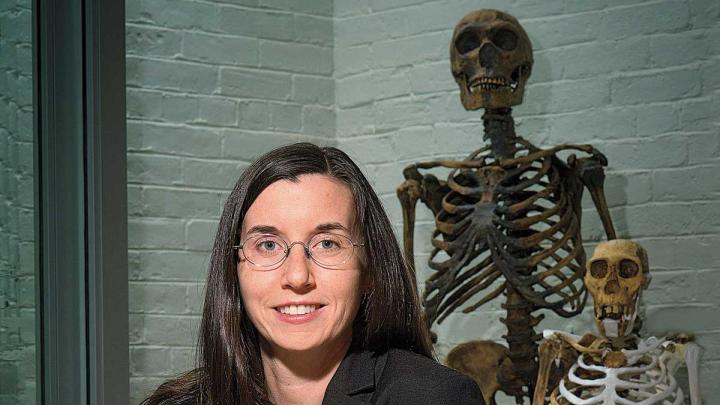“Teeth have rhythms inside them that are very precise, regular, and consistent, like rings in tree trunks,” says Tanya Smith, associate professor of human evolutionary biology. “And like tree rings, they can show you how long the organism has been growing—but on an even finer scale. Children’s teeth lay down a mineralized record of growth every day. Your entire childhood is recorded in your teeth.” The same holds for other primates. Thus Smith, using light microscopy, once examined a tooth section from a wild chimpanzee that died of Ebola in the early 1990s. After locating the “birth line,” the birth process inscribed in teeth, she determined the chimp had lived 1,396 days; field notes showed she was off by only 24 days. Smith learned microscopy at SUNY Geneseo as a biology concentrator who also studied biological anthropology, earning her B.S. in 1997; her Ph.D. in anthropological sciences came in 2004 from SUNY Stony Brook. She then spent several years at the Max Planck Institute for Evolutionary Anthropology in Leipzig, arriving at Harvard in 2008. The ability to attribute precise ages to juveniles, even those from the early Pleistocene, can shed light, she says, on evolutionary riddles like the origin of the very long childhood, relatively late age at reproduction, and lengthy lifespan of human beings. Primates that grow and erupt teeth earlier also reproduce sooner and live shorter lives. “Earlier hominins like Neanderthals seem to have had faster dental development,” she notes, “implying more accelerated overall growth and development than our species.” Away from the lab, Smith is an avid kayaker who enjoys field research like studying apes, monkeys, and lemurs in their natural habitats: “I love being out in the wild.”
Harvard Portrait: Tanya Smith

You might also like
A New Chapter for Harvard Arts
The Office for the Arts turns 50, and its longtime director steps down.
Education School Announces Interim Dean
Nonie Lesaux will serve as dean during the search for a new one.
Harvard Students form Pro-Palestine Encampment
Protesters set up camp in Harvard Yard.
Most popular
More to explore
What is the Best Breakfast and Lunch in Harvard Square?
The cafés and restaurants of Harvard Square sure to impress for breakfast and lunch.
How Homelessness is a Public Health Crisis
Homelessness has surged in the United States, with devastating effects on the public health system.
Portfolio Diet May Reduce Long-Term Risk of Heart Disease and Stroke, Harvard Researchers Find
A little-known diet improves cardiovascular health through several distinct mechanisms.






